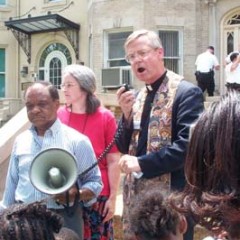
The Rev. Bob Edgar, a Democratic congressman and United Methodist minister who went on to lead the National Council of Churches through a painful series of restructuring cuts, died suddenly Tuesday (April 23) at age 69.
The man religious leaders remembered as a “bridge builder,” suffered a heart attack and had been exercising on a treadmill in his home in Burke, Va., said Mary Boyle, spokeswoman for Common Cause. Edgar became president of the Washington-based nonpartisan advocacy group in 2007 after serving two terms as the general secretary of the NCC.
“He was a man of great capacity who understood the importance of cross-cultural and religious dynamics,” said the Rev. Carroll Baltimore, president of the Progressive National Baptist Convention, who recalled traveling in a Common Cause interfaith delegation Edgar led to Vietnam in 2010 to learn about continuing effects of Agent Orange.
Baltimore said Edgar brought together Christians, Buddhists, Confucians and political leaders.
“He was able to link all of those pieces together and just remind us that we’re all made from the same cloth,” he said.
Elected to Congress from southeastern Pennsylvania in 1974, Edgar was one of the reform-minded wave of Democratic “Watergate babies” who swept Capitol Hill in the wake of the Watergate scandal. After losing a Senate race in 1986, he was president of Claremont School of Theology for 10 years before he started leading the NCC in 2000.
At the NCC, his tenure began with intense news media attention during the Elian Gonzalez case as he helped ferry the boy’s grandmothers to and from Cuba.
He soon turned to dealing with the NCC’s growing multimillion-dollar deficit.
“This is the hardest job I’ve ever had,” Edgar told Religion News Service early in his NCC tenure. “About every other day it’s the most fun I’ve ever had, but it’s the hardest job.”
Early on, Edgar sensed that the venerable ecumenical agency was losing its public voice, and was one of the early supporters of Christian Churches Together in the USA, which brought the NCC’s mainline Protestant, Orthodox and black churches together with evangelicals and Catholics for the first time.
The conservative Institute on Religion and Democracy often criticized the NCC and issued a 2006 report that claimed Edgar tried to help save the still-troubled NCC with donations from liberal philanthropists.
IRD President Mark Tooley said he was saddened to learn of Edgar’s death.
“Although IRD was frequently critical of the NCC’s policies under his rule, he was always cordial in our personal interactions,” Tooley said. “Edgar did temporarily revive the NCC, but, as the NCC has recently further shrunk and still struggles, it appears that revival could not be sustained after Edgar’s departure.”
Former NCC co-workers and colleagues, who remembered Edgar’s fondness for running, noted his sense of humor and penchant for bad puns, his support of the “What Would Jesus Drive?” campaign and his boundless energy.
“I thought that should be every aging person’s goal — to be as physically fit as Bob Edgar,’’ said Philip Jenks, retired communications officer for the NCC, who was four years younger than his supervisor. “Sometimes God’s sense of humor catches up with us.”
The Rev. Leslie Copeland-Tune, former assistant director of justice and advocacy at the NCC, added: “He just really was a true believer and a believer in making sure that people who were the least of these did not suffer because of our selfishness.”
Edgar, who authored the 2007 book “Middle Church: Reclaiming the Moral Values of the Faithful Majority from the Religious Right,” was known for activities ranging from protesting the Iraq war to a coordinated arrest inside the U.S. Capitol in 2011 for praying to stop Republican budget cuts.
“That was the strength of the man,” said the Rev. Barbara Williams-Skinner, president of the Skinner Leadership Institute. “He was a bridge builder in the truest, most powerful sense of the word. He took the gospel seriously, the gospel of peace and the gospel of love.”






